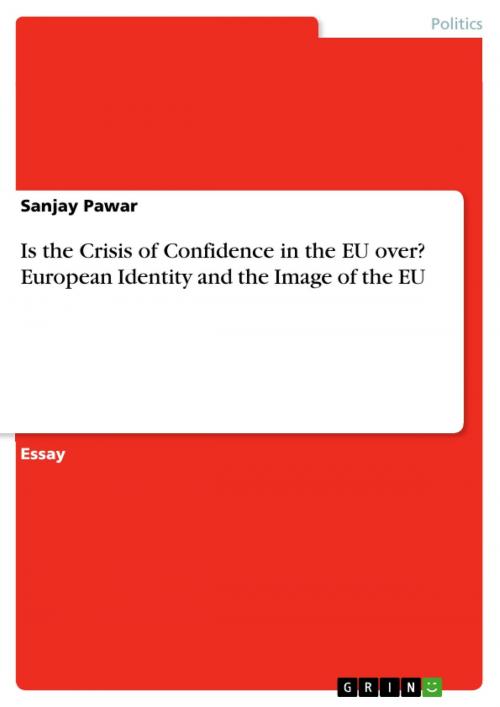Is the Crisis of Confidence in the EU over? European Identity and the Image of the EU
Nonfiction, Social & Cultural Studies, Political Science| Author: | Sanjay Pawar | ISBN: | 9783668011304 |
| Publisher: | GRIN Verlag | Publication: | July 3, 2015 |
| Imprint: | GRIN Verlag | Language: | English |
| Author: | Sanjay Pawar |
| ISBN: | 9783668011304 |
| Publisher: | GRIN Verlag |
| Publication: | July 3, 2015 |
| Imprint: | GRIN Verlag |
| Language: | English |
Essay from the year 2014 in the subject Politics - International Politics - Topic: European Union, Manipal University (MCES), course: MA European Studies, language: English, abstract: In February 1992, it was mutually decided among twelve member states of the European Union to introduce the Euro by 2002, with signing of the Maastricht treaty. Although, this was a monetary action taken by the Union, many consider it as a historical step towards building a common European identity. The polling data as of now reaffirms the same as most of the European citizens state that the Euro symbolizes the European Union (European Commission, 2014). It is further observed through surveys that European citizens did feel European initially; however there was a sharp decline in the feeling of being European and support for the European institutions after the euro crisis. The idea behind creating a common market 1957 through the Treaty of Rome was that participating member states would be benefited through economic integration. European citizens seemed to lose their faith in that idea with the eruption of the euro crisis. Many have observed that the European Union is not only going through financial and identity crisis but also facing the crisis of confidence. 'The European Union is the new sick man of Europe' (PEW Global, 2013). The crisis of confidence is not only limited to the European Union functioning but people are losing confidence in the political and financial elites and other European Union institution as well. There is wide gap between decision makers in Brussels and the citizens. In a nutshell, its democratic deficit, global economic situation, debt crisis, mismanagement and lack of integration and harmonization in certain areas are causing the European Union to face financial, identity, confidence crisis at the same time. The recent survey by the European commission and PEW research center show that citizen's confidence has increased since the new commission took office. The number of respondents who hold positive image of the European Union and has confidence in its decisions has increased. European citizens who hold negative image of the European Union has decreased by 3 per cent. 'We have observed that the recovery is gaining ground and the negative image is diminishing' said Charles de Marcilly, head of the 'Robert Schuman Foundation'. Juncker commission with the announcement of ? 315 billion investment plan in the first month after assuming office, had a positive effect on confidence level of Europeans.
Essay from the year 2014 in the subject Politics - International Politics - Topic: European Union, Manipal University (MCES), course: MA European Studies, language: English, abstract: In February 1992, it was mutually decided among twelve member states of the European Union to introduce the Euro by 2002, with signing of the Maastricht treaty. Although, this was a monetary action taken by the Union, many consider it as a historical step towards building a common European identity. The polling data as of now reaffirms the same as most of the European citizens state that the Euro symbolizes the European Union (European Commission, 2014). It is further observed through surveys that European citizens did feel European initially; however there was a sharp decline in the feeling of being European and support for the European institutions after the euro crisis. The idea behind creating a common market 1957 through the Treaty of Rome was that participating member states would be benefited through economic integration. European citizens seemed to lose their faith in that idea with the eruption of the euro crisis. Many have observed that the European Union is not only going through financial and identity crisis but also facing the crisis of confidence. 'The European Union is the new sick man of Europe' (PEW Global, 2013). The crisis of confidence is not only limited to the European Union functioning but people are losing confidence in the political and financial elites and other European Union institution as well. There is wide gap between decision makers in Brussels and the citizens. In a nutshell, its democratic deficit, global economic situation, debt crisis, mismanagement and lack of integration and harmonization in certain areas are causing the European Union to face financial, identity, confidence crisis at the same time. The recent survey by the European commission and PEW research center show that citizen's confidence has increased since the new commission took office. The number of respondents who hold positive image of the European Union and has confidence in its decisions has increased. European citizens who hold negative image of the European Union has decreased by 3 per cent. 'We have observed that the recovery is gaining ground and the negative image is diminishing' said Charles de Marcilly, head of the 'Robert Schuman Foundation'. Juncker commission with the announcement of ? 315 billion investment plan in the first month after assuming office, had a positive effect on confidence level of Europeans.















